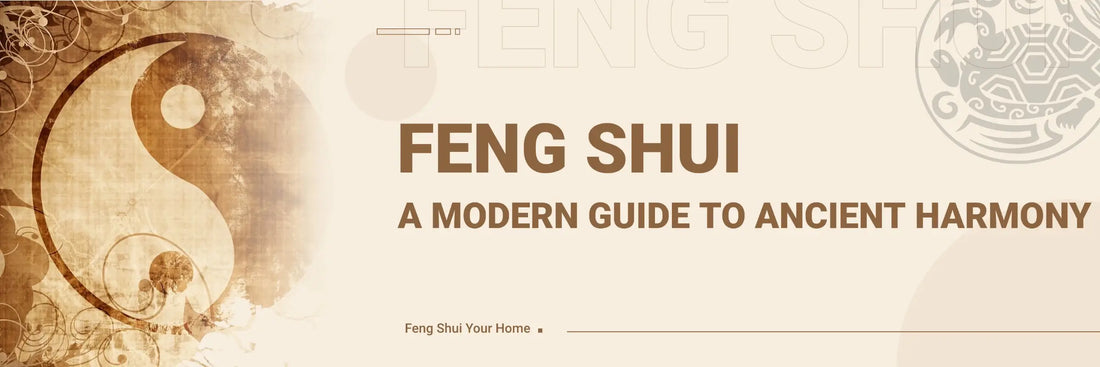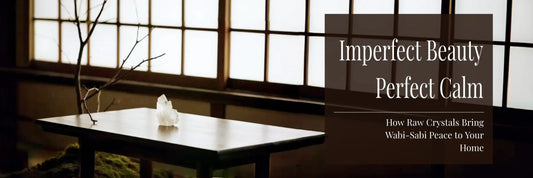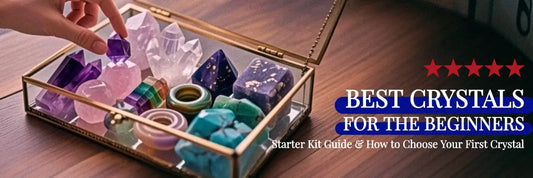
Feng Shui: A Modern Guide to Ancient Harmony
VioletFernShare
Feng Shui, which literally means "wind and water," is an ancient Chinese system of arranging your environment to enhance balance, energy, and prosperity.
In the West, it's commonly associated with home and office design, but its roots go far deeper. It is not merely about how furniture is arranged, but about aligning your environment with natural forces to improve your life.
At its core, Feng Shui is about Qi—the life force that flows through everything.
The way your home, office, or even furniture is positioned can either support or block this natural energy. When Qi flows freely, so does your good fortune.
By learning how to channel and harmonize vitality, you can create a space that helps you thrive in all aspects of life—whether it's wealth, relationships, or health.,
I. The Fundamentals of Feng Shui: Elements, Symbols, and Key Spaces
I-1. The Five Elements
Feng Shui is built on the dynamic balance of five elements:
- Wood — Growth, vitality, creativity
- Fire — Passion, transformation, visibility
- Earth — Stability, nourishment, grounding
- Metal — Precision, clarity, efficiency
- Water — Flow, abundance, emotion

These elements are used in Feng Shui to improve different life areas.
Wood promotes growth and creativity, making it ideal for family and health areas.
Fire enhances passion and visibility, so it works wonders in the fame and love areas.
Earth creates stability, making it the perfect foundation for health, while Metal supports clarity and efficiency for wealth and career.
Finally, Water supports abundance and emotional balance, perfect for career success and social harmony.
I-2. Four Celestial Animals: The Guardians
Traditionally, Feng Shui considers the ideal spatial arrangement as supported by four mythical creatures:
- Black Tortoise (North) — Protection from the back (e.g. a solid wall behind your bed)
- Red Phoenix (South) — Open space and vision in front
- Green Dragon (East) — Vibrant energy on the left
- White Tiger (West) — Controlled strength on the right
These directional archetypes guide how spaces like bedrooms and workspaces should be arranged.
In Feng Shui, your bed or desk should ideally be placed in a command position — a location where you can see the entrance, but are not directly in line with the door.
This symbolizes control and awareness, ensuring that you are prepared for anything that comes your way.
I-3. Common Feng Shui Spaces
Each room in your home corresponds with a specific area of life. Here's how to optimize each space for better harmony and the flow of Qi:
Bedroom — Love, Rest, Relationships
The bedroom represents your personal relationships and emotional well-being. Ensure a restful space for relaxation and romance.
Tips:
- Place the bed against a solid wall with a clear view of the door.
- Use calming colors like pale pink and lavender.
- Keep the area around the bed clutter-free.
Living Room — Social Harmony, Community
The living room is where family and friends gather, promoting social connections.
Tips:
- Arrange furniture for easy conversation.
- Use warm colors like earth tones and light greens.
- Add natural or soft lighting for a cozy feel.
Kitchen — Health, Nourishment
The kitchen is linked to health and prosperity.
Tips:
- Avoid placing the stove directly in line with the door.
- Use vibrant reds and yellows to stimulate energy.
- Keep the space clean and organized.
Study/Library — Knowledge, Wisdom
The study promotes intellectual growth and focus.
Tips:
- Place the desk in a command position facing the door.
- Use blue and green for calm and concentration.
- Keep the workspace organized.
Bathroom — Purification, Cleansing
The bathroom is for cleansing but should not drain energy.
Tips:
- Always keep the toilet lid closed.
- Use light, neutral colors like whites or light blues.
- Avoid large mirrors reflecting the toilet.
Office — Career, Achievement
The office symbolizes career success and productivity.
Tips:
- Position your desk to face the door, but not directly aligned with it.
- Use professional colors like green or brown.
- Keep the desk organized for focus.
II. Practical Tips to Improve Feng Shui
Small adjustments can shift your space's energy in powerful ways:
II-1. Use Crystals
Crystals are natural energy conductors that enhance or balance the five elements in your space.
They are powerful tools to help harmonize Qi, boost specific energies, and promote emotional well-being.

Amethyst Crystal Scepter| Unleash Spiritual Energy and Inner Power
Here's how to use them:
- Citrine and Pyrite — These stones are known to attract wealth and abundance. Place them in the wealth corner (southeast) or near your financial documents to activate prosperity.

[Blog: 12-crystals-to-boost-your-wealth Section2-2]
- Amethyst and Clear Quartz — These crystals are excellent for spiritual healing and purifying energy. Amethyst, in particular, is known for promoting tranquility and mental clarity, making it a perfect fit for meditation spaces or the bedroom.
- Rose Quartz — This crystal is the ultimate stone for love and harmony. It promotes compassion and emotional healing, and is best placed in the relationship corner (southwest) of the bedroom or living room.
By placing these crystals in the correct Feng Shui positions, you can enhance their ability to attract good energy and create a balanced, peaceful environment.
DISCOVER MORE:
We have provided a detailed introduction to 12 types of wealth-attracting crystals, as well as how to use crystals to enhance financial luck in our article:

II-2. Add Plants
Plants represent the Wood element, which symbolizes growth, freshness, and vitality.
Adding live plants in your home enhances the flow of Qi and can help create a sense of natural harmony.
- Best Placement: Place plants in the east (health) or southeast (wealth) sectors of your home to enhance vitality and attract good fortune.
- Types of Plants: Opt for plants with rounded leaves or those that are known for their ability to purify the air, such as snake plants, peace lilies, or bamboo. Avoid plants with sharp, spiky leaves, as they may create negative energy.
Plants also help connect you with nature, bringing in natural energy and balance.
II-3. Keep Spaces Tidy
Clutter blocks Qi and causes stagnation.
Keeping your home tidy and organized is one of the simplest and most effective Feng Shui techniques for improving energy flow.
Here's how to get started:
- Entryway: Start with your entryway, as this is the first place energy enters your home. A clean, welcoming entrance sets the tone for the entire space.
- Room by Room: After the entryway, move room by room, focusing on high-traffic areas first, like the living room and kitchen. Keep countertops and surfaces clear of clutter.
- Under the Bed: Avoid storing items under the bed, as it can block the flow of energy and create restlessness.
A clean, organized space helps promote clarity of thought, improves mental well-being, and allows Qi to flow freely.
II-4. Use Meaningful Decor
Decor should uplift your mood and promote positive energy. Avoid using decor that brings negativity or reflects stagnant energy.
-
Art: Choose artwork that reflects your aspirations, values, and emotions. Opt for landscape paintings or family pictures to strengthen relationships and positive energy.
- Avoid Broken Items: Broken items symbolize decay and negativity, so repair or replace any damaged decor. This applies to everything from furniture to kitchenware.
- Mirrors: Mirrors should reflect light and positive energy. Avoid placing mirrors facing your bed or directly reflecting clutter.
Decorating your space with intention will create an environment that feels uplifting and inspiring.
II-5. Energize with Light and Scent
Lighting and scents are two powerful tools to refresh vitality. Use both to create a pleasant atmosphere that encourages positive energy.
- Lighting: Use natural light as much as possible. Soft, warm lights in the evening help to relax the mind and body. Pendant lights or floor lamps with warm-toned bulbs are ideal for creating a cozy, inviting atmosphere.
- Scent: Essential oils, incense, or scented candles can refresh stagnant energy. Sandalwood, lavender, or citrus are excellent for calming, uplifting, and promoting clarity.
Meditation and Prayer Crystal Scented Candle | Peace of Body and Mind
With these simple yet effective Feng Shui tips for home, you can dramatically improve the energy in your space, bringing more harmony, peace, and prosperity into your life.
III. Feng Shui Don'ts: Common Mistakes to Avoid
- Mirrors Facing the Bed — Reflects energy and disturbs rest.
- Broken or Dead Plants — Represents decay.
- Cluttered Entrances — Stops Qi from entering your home.
- Toilets in Wealth Area — May flush away prosperity.
- Desk Facing a Wall — Blocks vision and progress. Instead, place a supportive image or mirror.
IV. Feng Shui FAQ
: Do I need a compass to apply Feng Shui?
: Yes. Classical Feng Shui relies on directions; a compass or app can help align the Bagua map properly.
: What's the difference between classical and Western Feng Shui?
: Classical Feng Shui uses compass directions; Western Feng Shui uses the front door alignment method (like the Bagua map).
: Is Feng Shui a religion?
: No, it's a philosophy of spatial energy rooted in Chinese metaphysics.
[Introduction]
: Can crystals really improve my Feng Shui?
: Crystals are tools. When placed intentionally, they help focus and direct Qi.
[Section2-1]
: How often should I adjust my Feng Shui layout?
: Seasonally or when major life changes happen—new job, relationship, move, etc.
V. Final Thoughts
Feng Shui is more than an aesthetic—it's about creating an environment that supports your life goals and well-being.
Whether you're enhancing wealth, attracting love, or simply seeking peace, your space is your silent ally.














